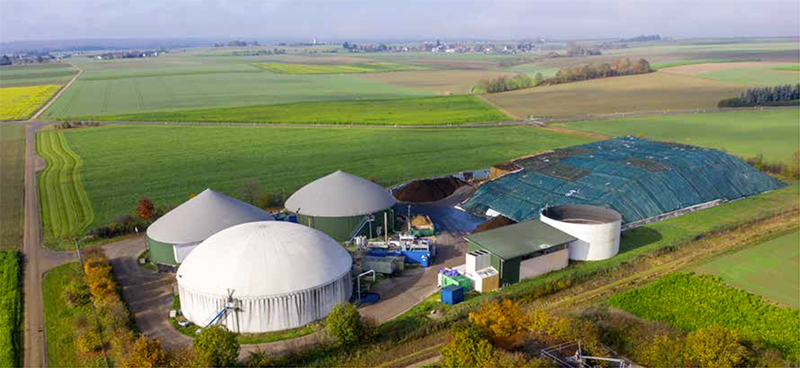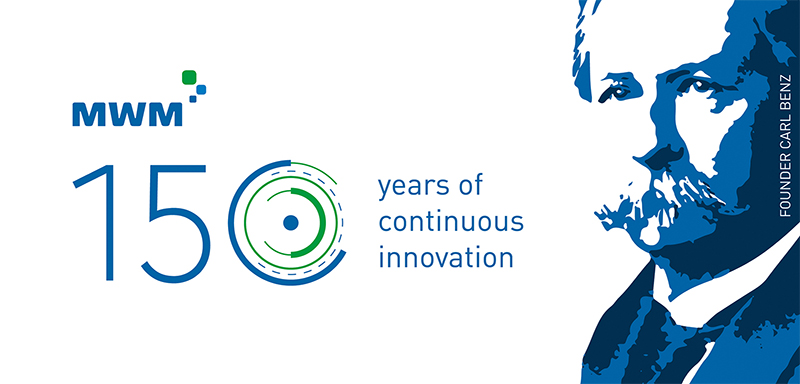Biogas Plants and Wildflower Fields for Sustainable, Green Energy Generation: MWM Supports Biodiversity Week of the German Biogas Association
Mannheim, July 12, 2021
By means of the nationwide biodiversity campaign week under the motto #blühendesLeben (“blooming life”), the German Biogas Association draws attention to the potential of biogas for the energy industry and the protection of insect and wildlife diversity. The campaign week runs from July 12 to 18, 2021. As a member of the German Biogas Association, MWM advocates sustainable and eco-friendly energy supply and supports initiatives to protect biodiversity.
Flexible, Demand-Oriented Power Generation with Biogas Plants
Energy generation with biogas offers various ecological and economic benefits. Biogas represents a sustainable alternative to fossil fuels. Biogas, which mainly consists of methane and carbon dioxide (CO2), is gained through the anaerobic digestion of organic waste in the digester of biogas plants. During the combustion, the amount of emitted CO2 merely corresponds to the amount that the substrates absorbed during growth. In this process, cogeneration power plants that produce power from biogas prevent emissions that would otherwise be emitted by fossil fuels.
Thanks to the controlled storage in a low-oxygen environment, the waste cannot decompose and release gases into the atmosphere in an uncontrolled manner. Rather, the methane it contains is extracted and used for the generation of heat or electrical energy.
Biogas plants and biogas-fueled cogeneration power plants already constitute an important source of income for many farmers. Operators increasingly turn to flexibilizing their biogas plants in order to be able to feed in the generated power as needed. Biogas plants supply power at all times, regardless of the weather conditions. The heat from biogas plants can be used for heating homes or public buildings and institutions. The German Renewable Energies Act (EEG), which entered into force in 2012, provides for the subsidization of biogas plant flexibilization measures. To encourage plant operators to switch to demand-oriented power generation, the newly amended EEG offers a reliable perspective. Germany’s federal government additionally subsidizes the development and expansion of the long-term use of heat via local heat networks at biogas locations where previously, the heat had not been used much or not at all.
The energy that a biogas plant produces from a hectare of crops exceeds the energy required for the digestion and cultivation by a factor of four to six. The positive carbon balance of biogas plants greatly contributes to climate protection. For example, a standard biogas plant with an output of 400 kW saves about 1,800 t of CO2 a year compared to a fossil power plant of the same size.
MWM Power Plant Solutions for Sustainable Biogas Plant Projects
In the German state of Saxony-Anhalt, for example, the medium-sized agricultural company Gebrüder Nooren GbR has rolled out a large project for the upgrade of eight biogas plant locations with new MWM TCG 3016 V12 and V16 gas engines. The biogas plant operation is based on the sustainable utilization of animal waste. The MWM cogeneration plants are designed for flex operation of the biogas plants and serve the buffering of peak loads. The previously existing cogeneration power plants, which are powered by MWM gas engines of an older generation, are used to generate the base load.
In the Alb-Danube district, the cogeneration power plants of BG Biogas GmbH, whose engines have been replaced with MWM TCG 3016 gas engines, supply the population with heat and power. The plants are fueled with biogas that is gained exclusively from the digestion of energy plants such as corn and whole plant silage.

MWM offers biogas-optimized gas engines, complete plants, and containers for combined heat and power (CHP) generation. MWM cogeneration power plants (CHP plants) enable economic, efficient energy generation and are suitable for flexible operation. The on-site plant transforms the employed energy into heat and electrical energy. MWM’s CHP plants, gas engines, and containers achieve maximum efficiency in various output segments. MWM also provides the system components required for gas processing and treatment. Where generators are installed in remote areas, the generated energy may be used exclusively on site.
Further Information:
- German Biogas Association: Biodiversity Campaign Week (in German) *
- Power Plant Solution for Agricultural Biogas Plants
- MWM Distributed Power Plants
- Using the Flexibility Bonus: Flexible Biogas Future with MWM (in German)
- Climate-Friendly Power and Heat Energy with MWM Gas Engines: Biogas Plants Continue to Be Key Factor in Carbon Reduction
- 97 Percent Availability: Biogas-Fueled MWM TCG 3016 Engines Supply Energy to Alb-Danube District
- Double Bioenergy Output in Less Than Two Years: Agricultural Company Upgrades Engines at Eight Cogeneration Power Plant Locations with MWM TCG 3016 V12 and V16 Gas Engines
- MWM Flex Cogeneration Power Plant for Biogas Plant in Lower Saxony Designated “Cogeneration Power Plant of the Month” of January
* You can use the link above to leave the MWM website and reach the external website of another provider. The data protection regulations of this provider apply there and cookies may be set by this provider. This is beyond our control.
Contact Media
Aljoscha Kertesz
Manager Communications
T +49 621 48 18 35 76
E mwm-press@cat.com
Frank Fuhrmann
Online Editor
Member of DPV / German Press Association
T +49 621 48 18 35 16
E mwm-press@cat.com








































